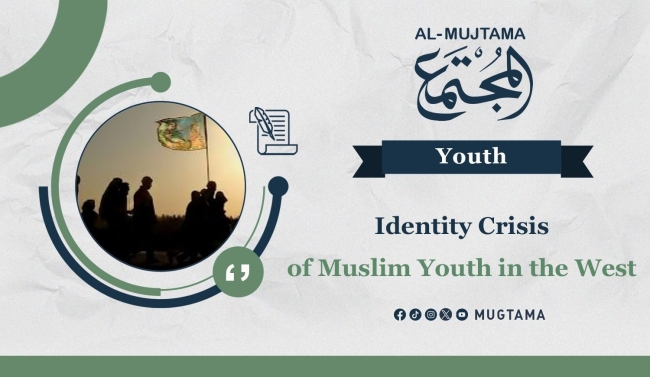Muslim youth today face immense challenges in Western societies, with the most significant of these being the challenge of religious identity. With increasing cultural, political, and economic pressures, these young people find themselves in a struggle that threatens their psychological and social stability. They must reconcile the demands of their faith with the demands of the society in which they live, leading to a division where some become negligent in their faith, while others become extreme.
The Islamic identity stems from the doctrine of monotheism, which forms the core beliefs of a Muslim and governs their interactions with others, as well as their appearance, reflecting their affiliation with Islam. Preserving one's religious identity does not imply isolation or disengagement from other cultures and religions. Instead, a Muslim should be an honorable example, correcting the misconceptions that have been unfairly associated with Islam and Muslims.
According to Pew Research Center statistics, the number of Muslims in the European Union countries reached about 26 million by 2016, a number that continues to grow along with numerous obstacles and challenges. After the events of September 11, Islam has often been perceived as a terrorist and extremist religion, leading to increased racism and persecution of Muslims in America, in particular, and Western countries in general, due to rising hostility towards them. For instance, in 2009, Switzerland's largest party proposed a referendum to ban the construction of minarets. In 2019, a pregnant woman in Australia wearing a hijab was severely attacked and had to be hospitalized. A study by researchers at Charles Sturt University found that 96% of women who reported physical assaults and sexual harassment were hijabis. Additionally, a survey by the European Union Agency for Fundamental Rights revealed that about 92% of Muslims have experienced racial discrimination in various forms, with 53% of them due to their names. A study by Rice University showed that Muslims in America are five times more likely to be harassed by police because of their religion compared to other faiths.
Thus, Muslim youth find themselves between two extremes: some are afraid and seek to assimilate into these societies without facing persecution or assaults, leading them to abandon their identity. Others may join extremist groups, isolating themselves from a society that rejects them. According to Dr. Sana Asad, a researcher at San Francisco State University specializing in the identity crisis among youth, one in three children aged 5 to 9 hides their Muslim identity from their peers. One in two children is unsure if they can be both Muslim and American at the same time, and one in six children sometimes pretends not to be Muslim to fit into society.
There are three main reasons exacerbating the identity crisis among Muslim youth in the West:
1- Lack of true understanding of Islam: They do not comprehend the greatness of this religion, do not truly know Allah, and lack the knowledge that would strengthen their faith and certainty in the biography of the Prophet Muhammad (peace be upon him) and his companions. Consequently, they have no connection to this religion that qualifies them to follow it and bear its obligations.
2- Fear of affiliation with Islam: Many Muslim youth in the West live in constant fear of revealing their Islamic identity due to racism and persecution, preventing them from freely practicing their religious rituals. For instance, Muslim women might remove their hijabs to avoid unemployment, Muslims might change their Islamic names to Western ones, and some prefer to miss prayers rather than being seen praying in public places.
3- The dual-generation crisis: Muslim youth suffer from the intergenerational conflict, feeling caught between the generation of immigrant parents who do not fully understand their problems and force them to follow a religion that seems inconsistent with the life they live and the societies that surround them, and the Western society that does not accept them and sees them as intruders, reinforcing their feelings of alienation and lack of belonging.
The Solution
Youth need to learn the true Islamic religion, away from the negative models that distort its image. This can only be achieved by learning the correct creed, the noble Prophetic biography, and the stories of the great companions and followers so that they can take pride in their Islamic identity and defend it. Here, the importance of institutions in strengthening the youth's connection to their identity becomes evident. The family, mosque, and Islamic centers should support and be a refuge for this confused youth. If they lose their identity, they lose themselves and fall victim to psychological disorders and extremist sects, potentially taking an irrecoverable path.
And as Dr. Essam Hashim states: “When the individuals of the Ummah lost their identity and began to flounder in the darkness of contemporary civilization in search of an identity, a distorted version of Western civilization appeared among the youth of Islamic countries. There emerged those who imitate them in their dress, food, drink, and hairstyles, and even in their self-indulgence of pursuing their desires. Among the Muslim girls, there were those who abandoned their hijab, appeared on satellite channels as singers, dancers, or presenters. Worse still, there are those among our people who speak our language, who, in the name of culture and progress, seek to further erase the Islamic identity; they strive to uncover the hijabi, corrupt the well-behaved, and bring out the hidden and modest.”
This is the price we have to pay when we let go of our identity, we become a joke among other nations!
-------------------------------------------------------------------------------------
- The Identity Crisis of Muslims in Non-Muslim Societies, paradigm shift.
- The Identity Crisis of Muslims In Non-Muslim Society | Sheeren Salama.
- Youth and Islamic Identity, Islam Web.
- Youth and Islamic Identity, Al Jazeera Net.
- Muslim Youth in the West Investing in Social Media: Identity and Integration, Civilization Center for Studies and Research.


